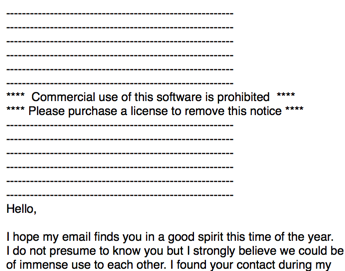CRTC fines individual for company violations under CASL
The Commission finds that nCrowd, Inc. committed one violation of paragraph 6(1)(a) and one violation of paragraph 6(2)(c) of Canada’s Anti-Spam Legislation (the Act) in relation to commercial electronic messages sent to recipients in Canada. The Commission also finds that Brian Conley is liable, under section 31 of the Act, for those violations. Accordingly, the Commission imposes an administrative monetary penalty of $100,000 on Brian Conley. CRTC
The commission’s report is well worth a read as it discusses many of the things I’ve noticed from spamming operations over the years. It’s pretty standard business practice for spammers to have a complex set of sorta but not really different businesses. They all interact and share data, but not legal liability. They’re mostly treated as one business by the principles and there’s no real dedication to any one brand name.
I don’t think I can describe it much better than the commission did:
The investigation uncovered a complex corporate network and a business pattern, characterized by acquisitions, foreclosures, and bankruptcies. During this chain of acquisitions, the customer email distribution list grew exponentially to reach more than 2 million email addresses. The common threads amid this corporate network and string of acquisitions of email distribution lists are the key players involved, namely Ghassan Halazon and Brian Conley Footnote3 , as shown in the chart below and detailed in the corresponding description.
Besides this chain of acquisitions, the investigation uncovered a whole network of corporations in various lines of businesses, throughout several countries, and characterized by (a) high frequency of business registrations, (b) high frequency of business acquisitions, (c) high frequency of corporate changes, including names and addresses, and (d) dealings with companies specialized in dividend routing and tax optimization services.
Through the years I’ve dealt with folks in this space as they regularly have delivery problems. Seeing the image of the myriad companies and bankruptcies and list transfers from the CRTC solidified in my mind that this really was a nest of spammers. Just look at how many businesses they went through without losing any email addresses.
It’s not coincidental that there are so many business name changes. In this case, there was some fraud going on for the customers, but frequent domain changes are a hallmark of spammers. If you talk to them, and I have, they will tell you they have to change names otherwise the ISPs block their mail. They’ll tell you they keep bounces low and remove complainers and follow all the best practices, but the ISPs hate them so they have to change business names.
Business models like this are nothing new, of course. One of my earliest clients asked me to help them set up a fake ESP. The idea would be to set up a whole bunch of different entities each with their own domains and business information. When one of the entities would get blocked, they’d tell the blocklist or ISP that it was a customer who was now terminated. After the block was lifted, they’d spin up a new customer and keep sending.
The ease at which spammers set up companies and sending domains and Its is the reason why ISPs treat mail with new domains and IPs as spam unless proven otherwise. 20 years of history indicates spammers do go so far as to create new companies to send spam. Given the recent action by the CRTC, it’s pretty clear that this isn’t ancient history, it’s continuing to this very day.


